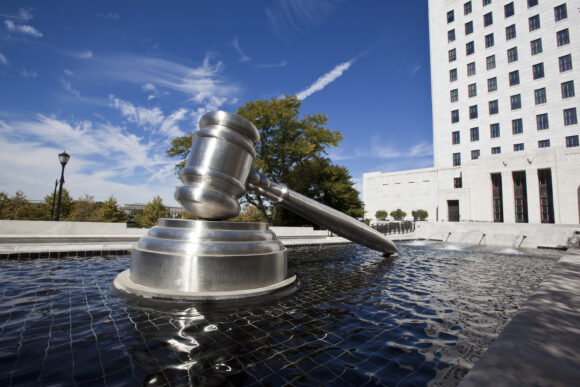COLUMBUS, Ohio (AP) — An Ohio business says its insurance company must compensate it for financial losses suffered during a pandemic-related shutdown. The insurance company refused to pay, saying its policy didn’t cover such losses. The Ohio Supreme Court heard arguments from both sides this month.
At issue before the court is a policy purchased by Neuro-Communication Services Inc., a northeastern Ohio audiology company, from the Cincinnati Insurance Co. The company was closed from March 23, 2020, until May 4, 2020, when Ohio Gov. Mike DeWine shut down businesses in the early days of the pandemic, and suffered “significant income losses,” according to a court filing that doesn’t specify an amount.
Those losses should be covered by the “all-risk” policy the company purchased from Cincinnati Insurance, company attorneys argued in an August court filing.
In oral arguments before the state high court earlier this month, an attorney for Neuro-Communication Services likened the virus to a dangerous element such as mold infiltrating a business.
Such an infiltration “constitutes direct physical loss or damage to property,” attorney Nick DiCello said during oral arguments on Feb. 8.
But lawyers for Cincinnati Insurance say the policy covers only accidental physical loss to Neuro-Communication’s property, not financial setbacks caused by closing because of the coronavirus.
The flu, though less serious, arrives every year, but property isn’t replaced or repaired in reaction, Daniel Litchfield, an attorney representing the insurance company, said during oral arguments. Similarly, the coronavirus hurts people but doesn’t alter buildings, he said.
“It would be absurd, for instance, to determine that as a matter of law a building suffered direct physical loss or damage because a virus is generally present in the community, just as the flu is generally present in the community during a season, every year,” Litchfield said.
More than 250 courts nationally have considered and rejected similar insurance claims for COVID-19 damages, according to the American Property Casualty Insurance Association, which says allowing coronavirus claims could be financially ruinous to the insurance industry.
But focusing on physical damage ignores the “unprecedented losses” suffered by the restaurant industry that go beyond physical damage, according to the Restaurant Law Center, which urged the court to side with Neuro-Communication Services.
On Wednesday, the 6th U.S. Circuit Court of Appeals rejected equivalent arguments by seven Michigan restaurant companies that also sought compensation from Cincinnati Insurance.
The businesses contended their losses were similar to those compensated after shutdown orders during unrest in Detroit in 1967 and 1968. But a three-judge panel disagreed, saying those orders eliminated all access to businesses, whereas the state’s 2020 order encouraged restaurants to remain operational for pick-up and delivery.
In its ruling, the appeals court upheld a lower court’s finding that “the mere presence of the virus on the physical structure of the premises does not amount to direct physical loss.”
In the Ohio Supreme Court case, justices seemed skeptical of the audiology company’s arguments. Chief Justice Maureen O’Connor noted that if the podium DiCello stood before in the courtroom was contaminated with the COVID-19 virus, a swipe of a bleach wipe would fix it.
DiCello argued the podium could be re-contaminated. “The question is when does the period of restoration end for this podium?” he said.
“You wipe it off, it still exists,” Justice Sharon Kennedy said. “It’s unmarred, it’s unharmed, I’m struggling with how you define that as property damage?”
For the period their property was unavailable, Neuro-Communication was “deprived of the effective use of it,” DiCello said.
A decision isn’t expected for months.
About the photo: The Gavel Sculpture in downtown Columbus sits in the reflecting pool alongside of the Supreme Court of Ohio building.
Was this article valuable?
Here are more articles you may enjoy.


 China Bans Hidden Car Door Handles in World-First Safety Policy
China Bans Hidden Car Door Handles in World-First Safety Policy  Elon Musk Alone Can’t Explain Tesla’s Owner Exodus
Elon Musk Alone Can’t Explain Tesla’s Owner Exodus  LA County Told to Pause $4B in Abuse Payouts as DA Probes Fraud Claims
LA County Told to Pause $4B in Abuse Payouts as DA Probes Fraud Claims  UBS Top Executives to Appear at Senate Hearing on Credit Suisse Nazi Accounts
UBS Top Executives to Appear at Senate Hearing on Credit Suisse Nazi Accounts 